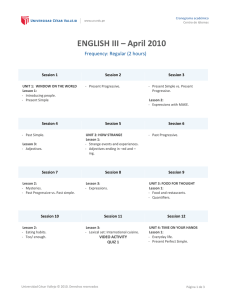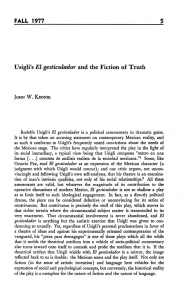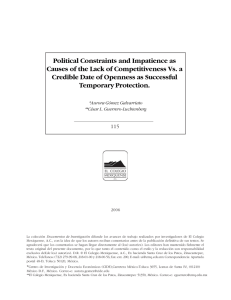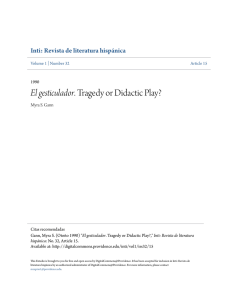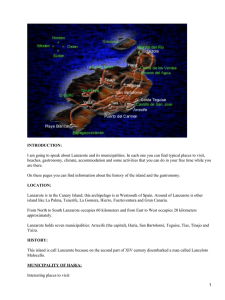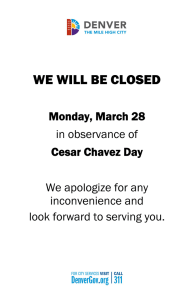"No conoces el precio de las palabras": Language
Anuncio
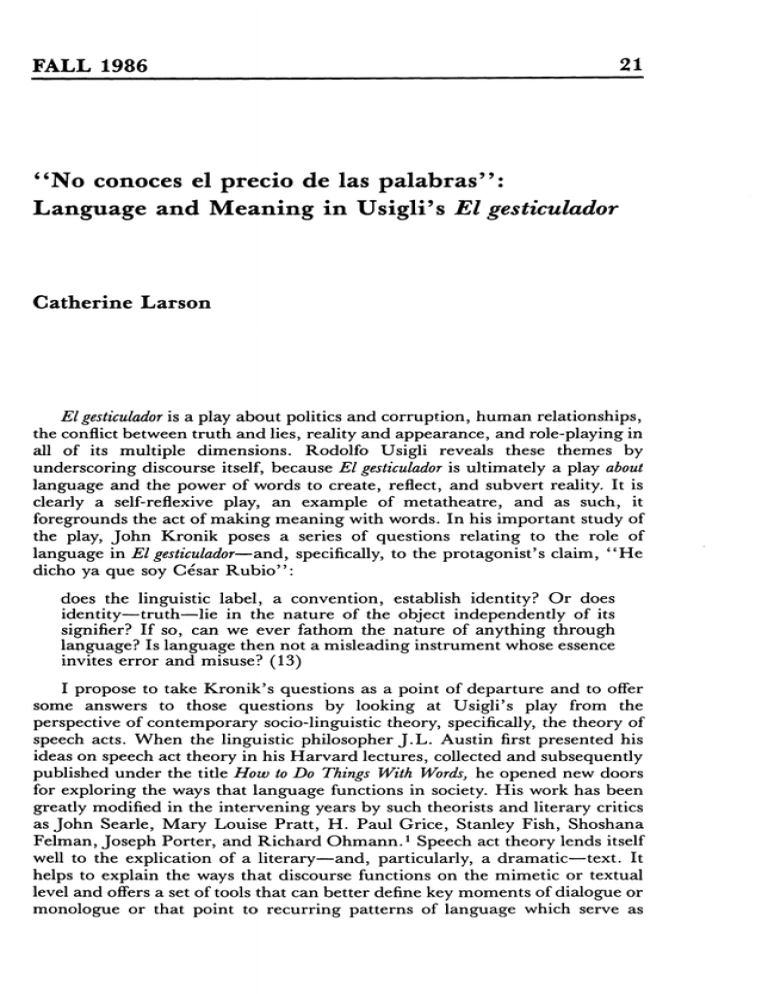
FALL 1986 21 "No conoces el precio de las palabras": Language and Meaning in Usigli's El gesticulador Catherine Larson El gesticulador is a play about politics and corruption, human relationships, the conflict between truth and lies, reality and appearance, and role-playing in all of its multiple dimensions. Rodolfo Usigli reveals these themes by underscoring discourse itself, because El gesticulador is ultimately a play about language and the power of words to create, reflect, and subvert reality. It is clearly a self-reflexive play, an example of metatheatre, and as such, it foregrounds the act of making meaning with words. In his important study of the play, J o h n Kronik poses a series of questions relating to the role of language in El gesticulador—and, specifically, to the protagonist's claim, " H e dicho ya que soy César R u b i o " : does the linguistic label, a convention, establish identity? O r does identity—truth—lie in the nature of the object independently of its signifier? If so, can we ever fathom the nature of anything through language? Is language then not a misleading instrument whose essence invites error and misuse? (13) I propose to take Kronik's questions as a point of departure and to offer some answers to those questions by looking at Usigli's play from the perspective of contemporary socio-linguistic theory, specifically, the theory of speech acts. When the linguistic philosopher J . L . Austin first presented his ideas on speech act theory in his Harvard lectures, collected and subsequently published under the title How to Do Things With Words, he opened new doors for exploring the ways that language functions in society. His work has been greatly modified in the intervening years by such theorists and literary critics as John Searle, Mary Louise Pratt, H . Paul Grice, Stanley Fish, Shoshana Felman, Joseph Porter, and Richard O h m a n n . 1 Speech act theory lends itself well to the explication of a literary—and, particularly, a dramatic—text. It helps to explain the ways that discourse functions on the mimetic or textual level and offers a set of tools that can better define key moments of dialogue or monologue or that point to recurring patterns of language which serve as 22 LATIN AMERICAN THEATRE REVIEW structural underpinnings for the dramatic text. Speech act theory proves particularly useful in analyzing El gesticulador, since the inherent specificity of speech pragmatics allows us to focus more accurately on two key areas: theories of reference and the notion of the promise. Theories of reference are related directly to the basic question of identity posited in the play: who is César Rubio? The notion of the promise underscores the power of language in a type of discourse that commits a speaker to a course of action. These two types of speech acts help show how the play's characters do things with words and illuminate the ways that language and meaning separate and cojoin in El gesticulador. Although there are many varieties of speech acts in the play and each could be analyzed separately, these two specific conversational acts are particularly useful indices of the linguistic complexities of El gesticulador. From the earliest moments of the play, Usigli invites us to join in the act of exploring how language both constitutes and undercuts reality. Indeed, he warns us in the title that dissembling or posturing is the key to El gesticulador. The linguistic patterns seen throughout the play seem to exemplify the inherent differences between intention and meaning and between literal levels of truth and the hidden levels of half-truths and lies. Specifically, in El gesticulador these linguistic oppositions surface due to the characters'—and the reader/spectator's—confusion over who César Rubio really is. 2 Generalized theories of reference prove to be useful tools for clarifying this confusion and for exploring the division between appearance and reality. Mark de Bretton Platts notes, " A n y general view about the relation between language and reality will both determine and be determined by views upon the notion of reference" (133). In Usigli's play, the semantic referent is the protagonist; the phrase "Yo soy César R u b i o " becomes the focus of conflict, and the plot reflects reactions to the relative authority of that name. As César Rubio deals with his simultaneously old and new identities, Usigli offers an evolving character, one whose reactions to his name and role(s) are in a constant state of change. César Rubio is a man who adopts another role, that of a famous Mexican general of the Revolution; ironically, the identity that he adopts has the surface features, the linguistic signifiers, of his own name. Yet the poor professor and the general have little, initially, in common. César begins his new identity by slipping in the back door. He allows the Harvard historian, Bolton, to assume that he is, indeed, the famous general who helped initiate the Mexican Revolution, and he continues the same linguistic tactic with the government functionaries who come to test him and to offer him the candidacy for governor. In this sense, meaning and intention are worlds apart, because truth is undermined not by a lie, but by a failure to deny misconceptions and clarify the ambiguity inherent in a name. We see how César uses language in this way in the following scene: César tells Bolton that the real César Rubio could be " e n apariencia, un hombre cualquiera . . . un hombre como Ud. . . . o como yo . . . un profesor de historia de la revolución, por ejemplo." When Bolton exclaims, " ¿ U d . ? , " the protagonist replies with a question: " ¿ L o he afirmado así?" He leaves no doubt in the mind of his listener, since Bolton responds, " N o . . . pero . . . comprendo" (33). FALL 1986 23 Usigli thus has his protagonist call into question the nature of the proper name, since César Rubio "constructs his fictional self entirely through misunderstanding, ellipsis, and insinuation'' (Kronik 13). In speech act terms, the protagonist opts out of the Cooperative Principle of Communication: " M a k e your conversational contribution such as is required, at the stage at which it occurs, by the accepted purpose or direction of the talk-exchange in which you are engaged" (Grice 45). Moreover, by failing to clarify his listeners' misconstrued understanding of his name and role, Rubio fails to observe the maxims of Quantity ( " M a k e your contribution as informative as required") and M a n n e r ("Avoid ambiguity"; Grice 45-46). Yet, the protagonist's role in the construction of this fictional self is not wholly passive. Cesar's assumption of two roles with the use of one name draws our attention to the plurality of self and the ways that people use language in order to act. Early in the play, Usigli posits the fundamental opposition of silence (failure to deny misconceptions through action) and speech (the active self-baptism of asserting identity). The protagonist moves from an early refusal to resolve the ambiguity inherent in his name to a more active assumption of a new identity, albeit an identity that still maintains the surface characteristics of his own name. In the process, the assumption of that identity reflects an active "doing things with w o r d s . " Although "Yo soy César R u b i o " is clearly not a commissive (performative) speech act (Austin 150-63), the force of the assertion nevertheless obtains an indirect performative quality in this drama precisely because of the metatheatrical, as well as metalinguistic, implications of César Rubio's dual role. 3 The linguistic label, " C é s a r R u b i o , " becomes intimately tied to the inherent ambiguity of all fictive—and, especially, dramatic—language. Ironically, Usigli has his protagonist use a simile which underscores labels or names: César observes to Bolton, "todos [en México] son como las botellas que se usan en el teatro: con etiqueta de coñac, y rellenas de limonada" (83). Usigli invites the reader/spectator to participate in unravelling the linguistic codes of this metadrama, engaging us with basic questions about the role of language in society and in the theatre. The distinction between telling a blatant lie and neglecting to reveal the truth is illustrated early on in the play by César himself, as he counters his wife's accusation that he is a liar: "Yo no mentí . . . . Yo no afirmé nada, y le vendí solamente lo que él quería c o m p r a r " (43). This example of Cesar's philosophy presents the early César as wavering between the truth and lies, between honorable and shameful behavior. Interestingly enough, this example of discourse stand out in part because it illustrates mixed levels of vocabulary. Here, César uses the language of economics to discuss a moral issue, a fact which certainly renders the speech ironic. In other words, in this first stage of Cesar's character development, he claims that he is not a liar, but he couches that claim in language that offers a subversive reading. This reading undercuts Cesar's sincerity by exposing the unlikely union of business and morality. César repeatedly uses rationalizing and self-justification as tactics for abrogating the responsibility of revealing his true identity. He defends himself on two key occasions. In the first example, César speaks with his wife, Elena: " T o d o el mundo aquí vive de apariencias, de gestos. Yo he dicho que soy el 24 LATIN AMERICAN THEATRE REVIEW otro César Rubio . . . ¿a quién perjudica eso? . . . [otros mexicanos] sí hacen daño y viven de su mentira. Yo soy mejor que muchos de ellos. ¿Por qué n o ? " (46-47). The second example of Cesar's self-justification is found in his verbal duel with Navarro: " P u e d e que yo no sea el gran César Rubio. Pero ¿quién eres tií? ¿Quién es cada uno en México? Dondequiera encuentras impostores, impersonadores, simuladores . . . . Todos son unos gesticuladores hipócritas" (82). In both cases, Cesar's words reflect a desire to justify his actions by saying that he is no different from anyone else, that he is a product of an environment that breeds deception. His discourse reflects the second stage of his character development in coping with this lie. Here, he freely admits that he lied, but he tries to balance that lie within a social context. César claims that he is a product of society and social conventions, including those linguistic conventions that permit him to continue with his deception. 4 Toward the end of the final act, Cesar's assessment of this same lie takes on a new meaning. H e responds to Elena's question, " ¿ P o r qué habrías de arriesgar tu vida por una m e n t i r a ? , " as follows: " E s que ya no hay mentira: fue necesaria al principio, para que de ella saliera la verdad. Pero ya me he vuelto verdadero, cierto, ¿entiendes? Ahora siento como si fuera el otro . . . siento que el muerto no es César Rubio, sino yo, el que era yo . . . " (88-89). O n a surface level, César seems to have come full circle back to the claim that he never lied at all. His denial appears to smack of a kind of ultimate selfdelusion. Yet, on a deeper level, this speech reflects the César Rubio of the end of the play. The character has developed to such an extent that he is a different person from the César Rubio of Act I. Ironically, this character development results from a lie that has become a truth. The old César is transformed into a vital character, just as the initial lie of identity is transformed into a new truth. Even the protagonist's confession to Navarro illustrates how the name has become linked with Cesar's new identity. The words that Miguel overhears in Act III, " N o soy César R u b i o , " are ironically balanced by the sentence that follows: " P e r o sé que puedo serlo" (83). César Rubio has created a new reality out of the raw material of language; he has done things with words in a very literal sense, giving a linguistic label a new context. Truth and lies, reality and appearance, meaning and intention, speaking and silence become tightly interwoven in El gesticulador. The proper name as a signifier of reality and of truth is used ambiguously in the phrase "Yo soy César R u b i o . " For César, that linguistic label "counts a s " a communication of reality, in the sense that intention allows him to function simultaneously as both César Rubio, the general, and César Rubio, the professor. 5 The proper name is commonly perceived as merely a social convention for establishing identity. As such, it normally has no internal inherent power to create truth; it serves simply as a code to represent it. Yet, in this play, the dramatist uses the proper name in a creative and self-conscious manner. Usigli plays with the power of language to make worlds, rather than merely reflect them (Pratt, "Ideology" 16). His use of naming in this highly self-conscious manner may well be an instrument for modifying our conventional views of reference. The ways that we refer to ourselves frequently go beyond mere identification, with ourselves as the referent. In certain circumstances—obviously here in El gesticulador and in many other conversational acts occurring in natural language that parallel it—we " d o things with w o r d s . " FALL 1986 25 To better understand the ways that language makes worlds in El gesticulador, Usigli broadens the conflict from that embodied by the contrasting identities of César Rubio in order to include a second level of conflict, one between father and son. The speech act that epitomizes their conflict is a commissive act, the making of a promise. As a speaker and even more as a teacher and historian, it might be argued that César Rubio would have a social obligation to speak sincerely in order to transmit truth. Yet César plays with the ambiguity of language and obsfuscates literal truth as part of his quest for a better world for his family and his country. As such, he is opposed by the proponent of literal truth, his son, Miguel. César promises Miguel that he will not act dishonorably: " T e prometo no hacer nada que no sea honrado'' (22). The differing interpretations of how to act upon that promise form the basis for the conflict between father and son. For Miguel, as, interestingly, for J . L . Austin, a m a n ' s word is his bond (Austin 10-11). Austin and other linguistic philosophers have focussed a great deal of attention on the performative status of certain types of verbs. The promise is, specifically, a commissive, an act of discourse whose "direction of fit is world-to-word and whose sincerity condition is Intention" (Searle 14). A promise necessarily obligates the speaker to perform a future act or series of acts in strict accordance with the responsibility incurred by making that promise (Searle 14). César offers his son a promise and literally fails to keep his word. Nothing in the play, however, is as simple as the broken promise. Cesar's intentions may be judged as honorable, at least when seen in the context of the world that he faces in the Mexico of El gesticulador. O n the one hand, César Rubio is the epitome of the post-Revolutionary Mexican; on the other, he is presented as the only person capable of stopping the political control of a man who is even more corrupt and potentially damaging: Navarro. If Cesar's lies, broken promises, and half-truths undermine the literal level of meaning, it is because he acts in accordance with a higher motivation; intention thus becomes the key for understanding that character motivation. In terms of the protagonist's effective use of language in communication, César Rubio's linguistic patterns seem to display more emphasis on the force of his utterances than on their literal sense ("meaning as semantically determined," Leech 17). In addition, Cesar's use of language may be approached by contrasting it further with that of Miguel. Miguel lives for the truth; he is the consummate proponent of sincerity in language. H e expresses that love of truth in words such as, " Q u i e r o la verdad para vivir . . . tengo hambre y sed de verdad" (91). Yet his characterization lacks the depth and complexity of Cesar's. Miguel ultimately emerges as a shallow character, one who mouths platitudes and self-righteously judges his father, but who never shows any real character development. H e is one-dimensional, and his absence of internal conflict is reflected in his empty language. Indeed, when Miguel is finally given the opportunity to translate his ideals into positive linguistic and physical action, he retreats into silence and literally escapes conflict by fleeing. The final two words of the play, Miguel's anguished " ¡ L a verdad!," addressed to no one, ring hollow in the empty room. The meaning of " ¡ L a verdad!" must be seen as a reflection of the ambiguous use of truth—in language and in physical action—throughout the play. Miguel chooses to remain silent with regard to LATIN AMERICAN THEATRE REVIEW 26 the truth of his father's and Navarro's real identities. The son's failure to speak thus ironically parallels his father's decision to remain silent about his own true identity early in the play. This double silence has great implications with regard to the problems of defining truth and illustrating the difficulty of ever fixing it. The broken promise is another element that affects other aspects of the play's themes, characterization, and structure. Cesar's promise to Miguel is paralleled by the promise he receives from Bolton: CÉSAR—Tiene U d . que prometerme que no revelará la verdad a nadie. Sin esta condición no aceptaría el trato, aunque me diera un millón. BOLTON—¿Por qué? CESAR—Tiene usted que prometer. • • • BOLTON—¿Qué quiere usted que prometa entonces? CÉSAR—Prométame que no revelará la identidad actual de César Rubio. BOLTON—¿Puedo decir todo lo demás . . . y probarlo? CÉSAR—Sí. BOLTON—Trato hecho. (Le tiende la mano) (32) Usigli underscores the importance of the promise through the repetition of the verb prometer and through the nonverbal handshake which seals the agreement. Yet, Bolton does not keep his promise to maintain silence. The effects of that broken promise set in motion all of the remaining action of the play. Usigli makes a point of returning to this moment when Miguel reads aloud from the newspaper account of Bolton's revelations: " A l estrechar la mano de este héroe—dice Bolton—prometí callar su identidad actual. Pero no resisto la belleza de la verdad . . . " (48). Bolton openly admits that he is not a m a n of his word, while he ironically cojoins the broken promise with a quest for truth. His actions clearly parallel Cesar's broken promise to Miguel in the sense that intention and circumstance (or situation) take precedence over literal meaning and in the result that speaking and silence become ironically united in the conflict between telling the truth and lying. These broken promises are part of an ever-expanding spiral that ties the play together structurally and thematically: Cesar's promises to his family and compatriots, Navarro's promises to the masses—all return to the implicit dualities of truth and lies and of performing and failing to perform. Telling the truth and lying are thus closely interrelated in Usigli's play about language and reality. Meaning and intention, truth and lie become linked to the power of the proper name and in the far-reaching effects of the simple phrase, "Yo soy César R u b i o . " If César uses the proper name only in the sense that it ' 'counts a s " an expression of literal truth, we may, indeed, question the reliability of language's power ever to explain fully and to define reality. This question is further complicated when tied to the promise, a linguistically charged speech act. Yet, the ways that language functions in Usigli's play reflect the use of language in the real world. We do not always speak in strict accordance with linguistic conventions; language use does not always exemplify rule-governed FALL 1986 27 behavior. Indeed, the notion that Usigli seems to be laying bare in El gesticulador is that words are the media for illustrating the tension between power and authority in discourse. Usigli's characters repeatedly demonstrate the many subversive uses to which language can be put in society. They thus point to the legitimization of the lie precisely by contrasting the telling of lies with speaking the literal truth, with half-truths, with the use of ambiguous language, and with silence. These characters show how words both fit the world and make the world fit the words that we use. Usigli's characters use language self-consciously, a technique which is emphasized in the proper name and the promise. This metalinguistic technique then serves as a kind of structural underpinning for the other types of power plays in the dramatic text. As his characters test the limits of language use in Mexican society, Usigli integrates linguistic conflict into the conflicts in social and family relationships and in the larger political and historical conflicts that the play treats and embodies. This leads us back to the question posed earlier by John Kronik: " I s language then not a misleading instrument whose essence invites error and misuse?'' The literal answer to this question would have to beyes. But just as there are no easy answers in the rest of the play, Usigli invites us to further explore how the dramatic discourse of El gesticulador both foregrounds and undercuts all discourse. As a metadrama that additionally provides countless examples of metalanguage, El gesticulador engages the reader/spectator with basic questions related to the process of communicating in society and within the theatrical experience. When we see how César Rubio refers to himself and makes (as well as breaks) promises, we are also able to understand better how fictional characters—and we ourselves—do things with words. Ironically, César Rubio points to the power of language in society when he admonishes his son, " N o conoces el precio de las palabras" (14). With these words, Usigli offers his audience a key to unravelling the complexity of names, promises, truth, and lies in El gesticulador. Indiana University Notes 1. These theorists and literary critics have helped to define the ways that sociolinguistics may be applied to everyday discourse and to textual analyses. T h e list is far from complete; in the last five years, interest in the use of speech pragmatics as a tool for opening a literary text has led to a n u m b e r of speech act applications. T h e examples given here offer merely an introduction (both theoretical and applied) to the speech act model. 2. See also Saul Kripke, Naming and Necessity (Cambridge: H a r v a r d University Press, 1980), for a detailed study of theories of naming. 3. See Kronik's seminal article on El gesticulador. For a more detailed explanation of metalanguage in d r a m a , see Keir Elam, The Semiotics of Theatre and Drama (London: M e t h u e n , 1980). 4. George Woodyard observes, " T o d o s los personajes de [El gesticulador] llevan la máscara de la m e n t i r a , " " M á s c a r a s mexicanas y la imagen yanky en el t e a t r o , " Cuadernos CELCIT de Investigación Teatral (Caracas), Edición especial, julio de 1981, 17. 5. W h e n the protagonist states " Y o soy César R u b i o , " he " c o u n t s a s " César Rubio in the sense that he becomes self-actualized in the course of the play. For a more detailed study of " c o u n t s - a s " rules and linguistic conventions, see Kent Bach and Robert M . Harnish, Linguistic Communication and Speech Acts (Cambridge: M I T Press, 1979). In terms of El gesticulador, Kronik observes that the protagonist's use of language underscores the pragmatic use of convention: " M e a n i n g is attributed to the word; it does not emanate from i t " (13). 28 LATIN AMERICAN THEATRE REVIEW Works Cited Austin, J . L. How to do Things With Words. 2nd ed. Ed. J . O . Urmson and Marina Sbisa. Cambridge: Harvard University Press, 1975. Grice, H . Paul. "Logic and Conversation." In Syntax and Semantics. Vol. Ill: Speech Acts. Ed. Peter Cole and Jerry L. Morgan. New York: Academic Press, 1975, 41-58. Fish, Stanley. Is There a Text in This Class? Cambridge: Harvard University Press, 1980. Felman, Shoshana. The Literary Speech Act. Trans. Catherine Porter. Ithaca, New York: Cornell University Press, 1983. Kronik, John. "Usigli's El gesticulador and the Fiction of T r u t h . " LATR 11/1 (Fall 1977): 5-16. Leech, Geoffrey. Principles of Pragmatics. London: Longman, 1979. O h m a n n , Richard. "Speech Acts and the Definition of Literature." Philosophy and Rhetoric 4.1 (1971): 1-19. . "Speech, Literature, and the Space Between." New Literary History 4.1 (1972): 47-63. Platts, Mark de Bretton. " N a m e s and Objects." In Ways of Meaning. London: Routledge and Kegan Paul, 1979. Porter, Joseph. The Drama of Speech Acts. Berkeley: University of California Press, 1979. Pratt, Mary Louise. Toward a Speech Act Theory of Literary Discourse. Bloomington: Indiana University Press, 1977. . " T h e Ideology of Speech Act T h e o r y " Centrum 1.1 (1981): 361-68. Searle, John R. Expression and Meaning. Cambridge: Cambridge University Press, 1979. Usigli, Rodolfo. El gesticulador. Ed. R. E. Ballinger. Englewood Cliffs, New Jersey: Prentice-Hall, 1963.
